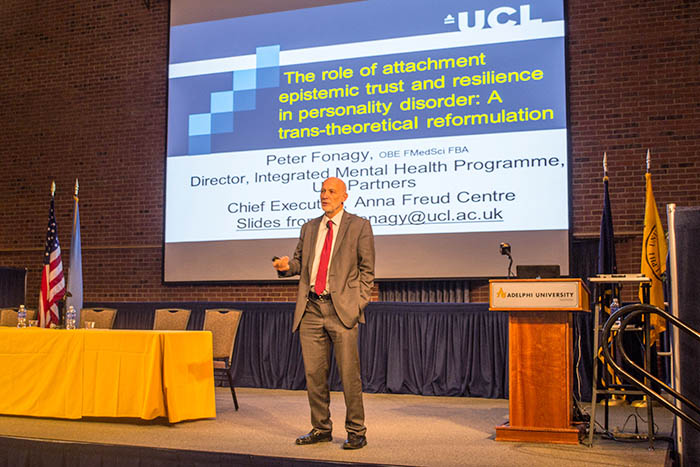Renowned psychologist Peter Fonagy, Ph.D., gives a lecture and a workshop for Adelphi's Derner Institute.
by Lauren Knopf
Peter Fonagy, Ph.D., the Freud Memorial Professor of Psychoanalysis at University College London and chief executive of the Anna Freud Centre, presented his lecture, “The Role of Attachment, Epistemic Trust and Resilience in Personality Disorder: A Trans-Theoretical Reformulation,” to an audience of students, faculty and alumni of the Gordon F. Derner Institute of Advanced Psychological Studies. The lecture was part of Adelphi’s Celebration Gordon F. Derner’s Life and Legacy on November 13, 2015, and was followed the next day by a workshop on Mentalization Based Treatment (MBT) for Borderline Personality Disorder (BPD), led by Dr. Fonagy.
Dr. Fonagy and his close collaborator Anthony Bateman, Ph.D., coined the term mentalization to capture a core human capacity that is frequently disrupted in individuals suffering from BPD. When we mentalize, we seek to understand ourselves and others in terms of our mental activity—thoughts, wishes, beliefs and intentions—rather than our observable behavior. An important function of our relationships with caregivers, known as attachment relationships, is fostering the ability to mentalize. Poor attachment relationships, as well as biological factors such as temperament, may create vulnerability to BPD by interfering with the motivation and skills to explore one’s own and others’ minds.
Without adequate mentalization skills, individuals with BPD struggle to develop a stable and coherent identity and are liable to misinterpret social and emotional cues from others. This creates a sense of social disconnection that is, Dr. Fonagy contends, “the most intense experience of pain of any mental disorder we know.” The pain is uniquely intense because the capacities that are compromised in BPD are those most closely linked with human survival: attachment, mentalization, and epistemic trust, which is the ability to relax our natural vigilance to threats in order to learn vital information about the world from trusted others. The fundamental question for people with BPD, Dr. Fonagy noted, is “Who can I trust to learn from?”
The singular goal of MBT, an empirically validated treatment for BPD developed by Drs. Fonagy and Bateman, is to restore mentalizing whenever it is absent. A major obstacle to this goal is the therapy itself, insofar as the therapeutic relationship stimulates the patient’s fears that he will be criticized, rejected and abandoned. “Mentalization stops when attachment is activated,” Dr. Fonagy explained. “When you feel intensely about another person, you cannot evaluate their social trustworthiness.” Signs that a patient has stopped mentalizing include inappropriate certainty about another person’s state of mind; excessive reliance on external evidence, such as facial expressions and behavior, to deduce internal states; and expressions of emotional distress that overwhelm cognitions.
Through a series of role play scenarios, Dr. Fonagy demonstrated and workshop participants had the opportunity to practice the techniques that comprise MBT. First, the therapist empathically validates the patient’s interpretation of and feelings about a given incident. Second, the therapist adopts a “not knowing” stance and expresses curiosity about the incident, modeling comfort with uncertainty for the patient. Next, the therapist might employ “contrary moves” to replace the patient’s one-sidedness with more balanced thinking, for example encouraging focus on the self if the patient is overly focused on another person, or drawing attention to affective states when the patient appears dissociated from emotion.
Although MBT is a manualized treatment, Dr. Fonagy emphasized that techniques for enhancing mentalization may be incorporated as a part of any therapeutic modality, including psychodynamic and cognitive-behavioral approaches. In fact, he acknowledged, MBT strategies are akin to much of the work done by psychotherapists of all orientations. “To my mind,” Dr. Fonagy concluded, “the critical issue is, whatever you’re practicing, doing a little bit more mentalizing can’t do any harm.”
Lauren Knopf is a clinical psychology doctoral candidate at the Derner Institute.
For further information, please contact:
Todd Wilson
Strategic Communications Director
p – 516.237.8634
e – twilson@adelphi.edu
